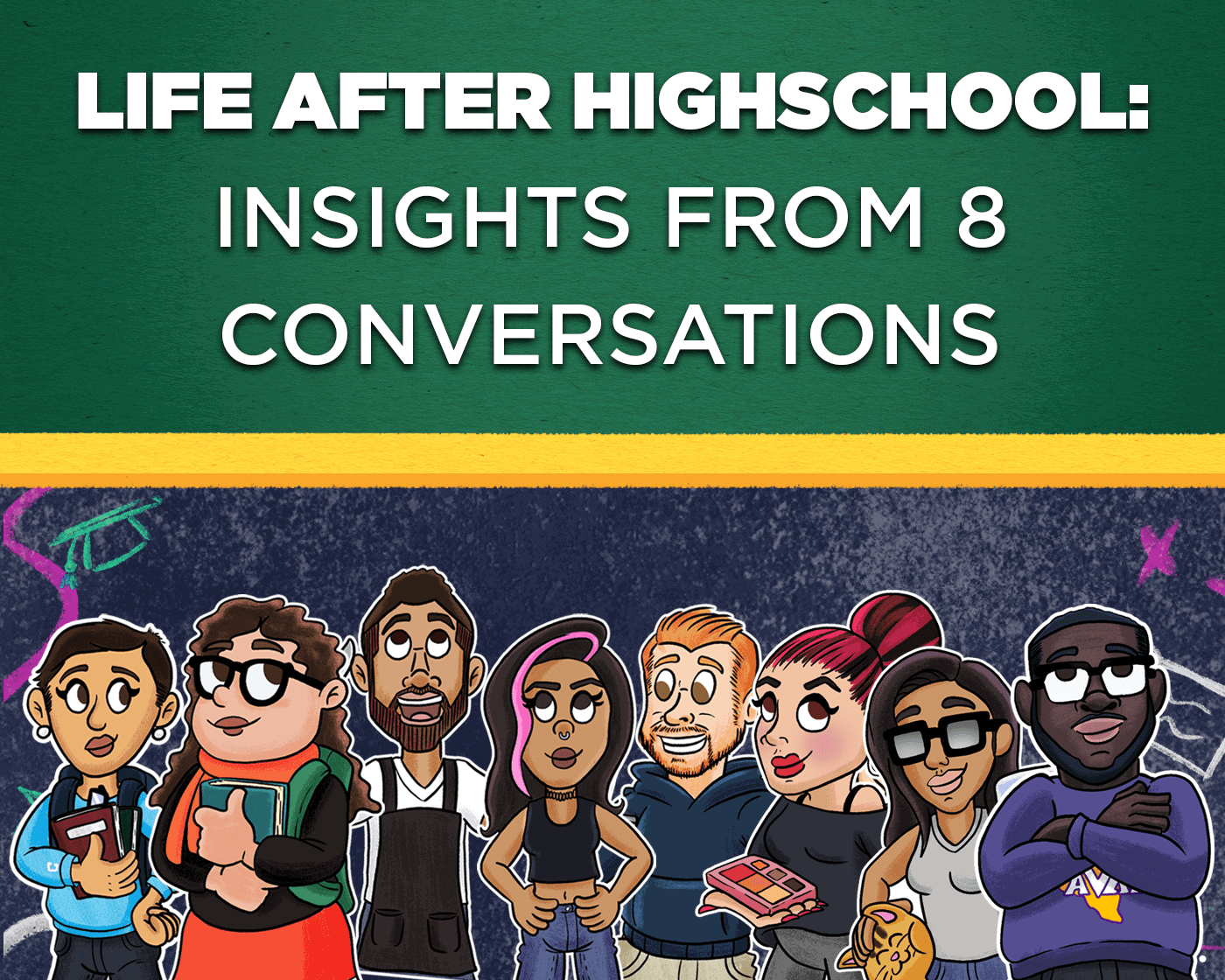What’s up VaynerNation!
We’re Team GaryVee and recently we sat down with 8 people for more insight on the #GV18to28 debate. While Gary’s message may be interpreted as “anti-college”, really it’s all about self-awareness. Remember, life after high school doesn’t have to be straight-forward or daunting. Everyone is so different, so why do we all have to do things in exactly the same way?
Our interviewees are 19 to 31 and they all took (or are in the process of) a different path to achieve their version of success. Are you in high school wondering what your next move should be after graduation? Maybe you’re currently applying for university or trying to snag your dream internship? Perhaps you’ve been out of school for a little while but now you’re trying to decide whether to go back. If any of that sounds like you, keep reading. We hope this brings you value.
Insight 1: Have patience; if you truly want a college degree, it may take time.
This insight comes from Glorian, a 19 year old immigrant from Venezuela who is putting off college to earn money for tuition and improve her English.
“Right now, I have a job, and I need to start saving money for college. I don’t have the ability to ask my parents to pay for it–I have to do it myself.
I’m not gonna lie, it’s scary. It’s scary to say it’s an investment; a multi-year investment. Maybe after so much time, I’m going to realize I don’t like what I’m studying. However, my mom has always told me that you need a secure plan. She pushed me to go to college.
I’m glad she did because a college education will prepare me for my dream career, to be a psychologist. There’s a lot of things that I still don’t know and there’s so many ways to mess up a person if you don’t have the correct information. I think college can give me the right foundation.”
Insight 2: Have self-awareness; begin your journey with your goals in mind and don’t let anyone bring you down.
This insight comes from Megan, a 21 year old Long Island native who’s attending Columbia University after applying as a high school student and getting in on her first try.
“After undergrad, I want to go to a law school that’s prestigious and rigorous, so I need to attend a similar undergraduate university. The top law schools definitely consider your undergraduate degree. I want to get a foot in the door with more competitive graduate schools. For some people, price is more important than prestige. My twin brother, for example, he wants to be a nurse so he’s more interested in what’s the most cost effective. But I know prestige begets prestige which will help me in the future.
I also believe my education itself will help me. There’s the theory behind something, then there’s practice and putting them together creates praxis. School helps me ask, “Why do we do things this way?” and “Can we do things differently?” An education gives you the basic knowledge of how systems work and also the tools to think critically about it. School doesn’t necessarily prepare you for the workforce, it gives you the scaffolding to or foundation to change the workforce or see if the processes are working the way they’re intended. It expands you, not prepares you.
In general, study what makes you passionate, not what’s practical. You’ll be much happier.”
Insight 3: Have Tenacity; changing your mindset is a strength not a weakness.
This insight comes from Glorimar, a 28 year old Venezuelan immigrant who also attends Columbia University. However, she went to community college first.
“I would recommend community college for anybody that needs a solid foundation. Especially for a student like me that never had college level education in English.
When I entered community college, I knew I was going to transfer…I’m studying Creative Writing because I like it. I had already spent three years studying something I was not passionate about. I have a degree in something practical. I didn’t want to spend the rest of my life wondering what if? I thought to myself, have the balls to follow your dreams, and don’t let people bring you down, especially people who can’t relate to your experience.
In general, you should be careful who you listen to. People who I did not admire, the managers at my job that have been there for 20 years and HATED it, they’re the ones who told me not to pursue my passion. People who I considered successful, people who seemed happy, they told me to go for it.”
Insight 4: Be proud of who you are, be proud of your generation, no matter what anyone says.
This insight comes from Sydney, a 21 year old who’s recently joined the workforce after dropping out of cosmetology school.
“Me, personally, and a lot of people in my generation [Gen Z], know we have to have multiple sources of income. Our parents or our grandparents, they would have one career and stick with it, it’s different for us.
Our generation is hyper vigilant because we’re the generation of flexing. We make a lot of money but we show it on instagram, it’s a constant pull. We’re always aware of who’s making money and comparing ourselves. A lot of people are becoming more open to different types of work because we refuse to struggle. We just keep going because we’re hustlers.
People say we’re lazy and entitled. We are, but we also fight for what we want. We’re greedy, kinda. It’ll keep us alive during the pandemic.”
Insight 5: Be open and taste everything! Who says you have to stick to one path?
This insight comes from Eunice, a 28 year old executive assistant from New Jersey who went straight to college, dropped out, tried community college (and finished cosmetology school), before re-enrolling in a four year college.
“I went to college purely because I had to. My parents are immigrants and education is a really big deal. My mom didn’t care what I went to school for as long as I was in school…I went to a four year college, community college, cosmetology school, you name it. I wish more people realized you don’t have to have a college degree to be successful at your job.
I think I learned more in the workforce than in college.”
Insight 6: Networking matters; it might get you a dream apprenticeship.
This insight comes from Frank, a 31 year old former-apprentice from New Jersey. After high school, he learned how to barber by learning under hairstylists in his area.
“To do the cosmetology course at my school, you had to be a ‘model student’…I was not (laughs). So, instead of waiting for my teachers to let me in, I asked a barber around my way if he would teach me a few things. I cleaned up around his shop and became his apprentice.
Frank worked as a barber for 15 years, before switching careers due to COVID. His advice to emerging apprentices?
“Don’t let anyone tell you, you can’t do something.”
Insight 7: Soft Skills Matter Just As Much As Hard Skills
This insight comes from Scott who, after high school, attended community college for two weeks before dropping out to work full time. Now he’s a 30 year old entrepreneur who’s recently expanded his business.
“This was reinforced at Apple. My whole goal is, if at the end of a conversation the person who I was working with was asked, ‘Hey, would you recommend Scott?’ That answer needs to be a yes.
Working at that store, they only care about that one metric and this was probably the biggest guiding light in my entire life. So I just took that and ran with it.
That metric is in everything I do in life now. Whether it’s real estate, video production, social media management, client success, or B2B deals.”
Bonus Insight For Educators! Be Open and Empathic
This insight comes from Frederick, a 19 year old college student (and future teacher/journalist).Some of you may recognize him from Tea with GaryVee earlier this year.
“As far as education, I just want to say: get to know people. Learn people, learn how people are, because you’re gonna meet so many different types of people in the education field.
You need to be well versed to be a teacher, support people, and help them succeed. You don’t necessarily need to be so legalistic about it, to the point where you don’t know how to approach a person. I feel like that’s what our education system has cultivated. That’s why I see a lot of educators are trying to dismantle that and I appreciate it.
Growing up, my dad made a difference in people’s lives. He would buy kids lunch if they needed it, he would show up at funerals…that’s the kind of difference I want to make in my students’ lives.”
We hope these perspectives help you understand that there really is no “right way” to success. Everyone’s definition of success is different, so it’s not wise to follow the advice of people who don’t understand your dream. If you want to read more, check out each #GV18to28 article, here on the GV Blog!




















Thanks for sharing. I read many of your blog posts, cool, your blog is very good.
Consulting review writing service platforms helps students https://scamfighter.net/blog/semester-vs-quarter-system select dependable options for academic support. When adapting to different academic structures, understanding the semester vs quarter system is essential. Each system affects workload and time management differently, and quality writing services can provide tailored assistance that aligns with either format, enhancing student productivity.
Your point of view caught my eye and was very interesting. Thanks. I have a question for you.
86597 431923Currently it seems like BlogEngine may be the greatest blogging platform out there correct now. (from what Ive read) Is that what youre employing on your blog? 455456
Set new goals and conquer every challenge in Drift Boss!
The Driving Directions tool is really helpful! It helps me find the fastest route to my desired destination without getting stuck in traffic.
59303 428848Actually clear internet site , thanks for this post. 707279
204909 770084Dead composed topic matter, thanks for data . 965116
deneme bonusu veren siteler: yeni deneme bonusu veren siteler – deneme bonusu veren yeni siteler
kazino online https://sweetbonanza25.com/# sweet bonanza oyna
orisbet
625326 485339Some truly good and helpful information on this web site, likewise I conceive the style holds excellent functions. 956819
Rbviet.net Rbesports – Địa chỉ cá cược thể thao điện tử uy tín, cung cấp tỷ lệ cược chính xác, giao dịch an toàn, nhanh chóng và hỗ trợ đa dạng game như LMHT, CS:GO, Dota 2… – 2025 March 28, 15:15
Rayesports.com Rayesports mang đến trải nghiệm cá cược esports hoàn hảo với kèo cược đa dạng, giao dịch tức thì, bảo mật tối ưu và hỗ trợ mọi lúc mọi nơi. – 2025 April 04, 11:19
Rbviet.net Rbviet – Lựa chọn số một cho người đam mê cá cược esports, nơi bạn tận hưởng kèo cược đa dạng, tỷ lệ hấp dẫn và hệ thống bảo mật tiên tiến. – 2025 April 11, 10:17